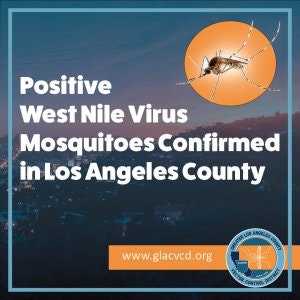West Nile Virus Positive Mosquitoes Confirmed in Los Angeles County

Los Angeles, CA (June 1, 2020). The Greater Los Angeles County Vector Control District (GLACVCD) has confirmed the first mosquito sample to test positive for West Nile virus (WNV) in Los Angeles County in 2020. The mosquitoes were collected from a mosquito trap in the city of Hacienda Heights (91745 zip code). GLACVCD routinely monitors populations of adult mosquitoes and tests groups of adult female mosquitoes for the presence of WNV and other mosquito-borne viruses.
“This detection should serve as a reminder that WNV is endemic in Los Angeles County. As temperatures increase, so do mosquito populations and disease risk, which poses a serious public health threat in our communities,” said Susanne Kluh, director of Scientific-Technical Services at GLACVCD.
WNV is transmitted to people and animals through the bite of an infected mosquito. There is no cure for WNV. One in five persons infected with the virus will exhibit symptoms. Symptoms can include fever, headache, body aches, nausea, or a skin rash. These symptoms can last for several days to months. One in 150 people infected with the virus will require hospitalization. Severe symptoms include high fever, muscle weakness, neck stiffness, coma, paralysis, and possibly death.
The late rainfalls coupled with warmer temperatures have contributed to increased mosquito activity in Los Angeles communities.
“Our agency will continue monitoring disease activity and treat affected areas,” said Mary-Joy Coburn, director of Community Affairs for GLACVCD. “Although the positive mosquitoes were collected in one area at this time, all LA County residents should take precautions, like wearing insect repellent and eliminating standing water around the home.”
Many mosquito repellents are available to prevent bites, but they do not all work equally well. The Centers for Disease Control recommend products with the active ingredients DEET, Picaridin, IR3535, or oil of lemon eucalyptus as being safe and effective against mosquitoes that can transmit disease when used according to the labels. Wearing loose-fitting long sleeves and pants can also help deter bites.
Any water left standing for more than one week in containers such as flower pots, fountains and pet dishes provides the perfect breeding habitat for mosquitoes. GLACVCD would like to remind residents that even the smallest water source can contribute to a large public health problem.
Mosquito control is a shared responsibility and residents must take an active role in reducing the threat of WNV in their neighborhoods by taking the following steps:
- Eliminate standing water in clogged rain gutters, rain barrels, discarded tires, buckets, watering troughs or anything that holds water for more than a week.
- Ensure that swimming pools, spas, and ponds are properly maintained.
- Change the water in pet dishes, birdbaths and other small containers weekly.
- Request mosquitofish from your local vector control district for placement in ornamental ponds.
- Wear insect repellent when outdoors where mosquitoes may be present.
- Report neglected (green) swimming pools in your neighborhood to your vector control district.
For more information, residents can contact the Greater Los Angeles County Vector Control District at 562-944-9656 or online at www.glacvcd.org. Follow the District on Twitter, Facebook and Instagram: @GLAmosquito
The Greater Los Angeles County Vector Control District continues to serve cities and communities of Los Angeles County amidst the COVID-19 pandemic but we need your help! View to see how you can take action now against mosquitoes to prevent the diseases they can transmit.
About GLACVCD
The Greater Los Angeles County Vector Control District is a public health agency formed under the authority of the California State Health & Safety Code. Our mission is to reduce populations of public health vectors below nuisance levels and prevent human infection associated with mosquito-transmitted diseases.
Media Contact
Mary-Joy Coburn, Director of Community Affairs | (562) 944-9656
